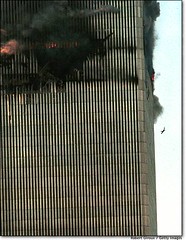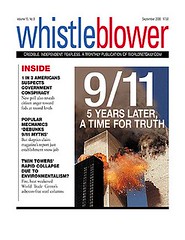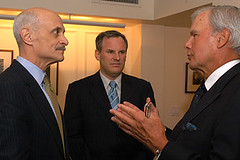Yesterday, media outlets published many headlines saying things as
"NYC releases New 9/11 Tapes". CBS even posted tapes for your listening pleasure [
click here to view]. This so-called release of 9/11 tapes is misleading. In fact, there has yet to be full disclosure by NYC as to what was going on in the WTC through 911 calls, dispatcher calls, and interviews of firefighters . The latter has been somewhat disclosed after the August 12, 2005 ruling of the Court of Appeals (the film "Loose Change" uses some of these interviews and dispatcher calls with firefighters.
Click here to view source material). The New York Times has posted the oral histories, or interviews, of firefighters on their website. If you click on any of the recently alleged disclosed 911 tapes you will hear a series of intermittent beeps. Those beeps are to block the words of the victims in the WTC. And as you listen you will realize that in fact nothing has been released. It's all a lie, a half-truth. Why mislead? Because it is important for those supporting the official conspiracy theory (the government) that the public believes the government is fully disclosing 9/11 evidence and it has nothing to hide. For example,
MSNBC does not mention anything about the obvious edits till page two. They spend more time discussing the tapes as though there is material to discuss. Listening to these edited tapes is like listening to a one-sided conversation. Why the edits? Why did these tapes take about four years to be disclosed?
Four months after 9/11, Jim Dwyer, a New York Times journalist, requested disclosure of 911 calls, dispatcher calls, and oral histories (audio and written) from EMT and firefighters. FDNY denied his request. In a 2005
article the New York Times said that they "sought copies under the freedom of information law in early 2002, but Mayor Michael R. Bloomberg's administration refused, leading to litigation." In 2004, the case went through the
NY Supreme Court and then to an Appellate Division where both decided in favor of FDNY and New York City (ruling for partial disclosure). FDNY argued that the Freedom of Information Law (FOIL) was limited by certain exceptions in Police Law. Both courts agreed and allowed material to be edited or blocked. The families that sued could have full disclosure of 911 calls, but other 911 calls were not disclosed out of an alleged privacy exception the court dreamed up to conceal the tapes. The case was then appealed to the District Court of Appeals in
Matter of New York Times Co. v City of N.Y. Fire Dept., 3 AD3d 340. They affirmed the lower courts decisions and added that the interviews should be disclosed (because they were public records).
What is interesting is that the Court of Appeals, Judge Smith writing for the majority, argued that 911 calls were not public records (while calling the interviews public). Perhaps I should say that they avoided that issue altogether. Smith ended up siding with the FDNY by allowing the privacy exception in the Public Officers Law § 89. What is fascinating is that Smith failed to see that 911 calls are public records. When you make a 911 call you are being recorded by a public entity and it is generally acknowledged by the caller that what they say goes into the public record. Courts have upheld full disclosure of 911 calls as public records. Private phone calls, on the other hand, cannot be recorded because it invades a private conversation between individuals. In addition to the public issue, Smith assumed the side of families (because there weren't any in the case) who wouldn't want disclosure and ignored the families of the WTC tragedy that had only shown support for full disclosure. Smith ignored this fact and advocated for those families not in the legal suit (who voiced no opinion). Also, he expanded the idea of privacy rights by extending it to dead people. Specifically, he allowed relatives of dead people to hold, as a kind of trust, the privacy rights of the deceased. In that way their rights essentially never go away because someone can always claim the deceased's privacy right. Again, Smith fails to do several things: (1) he ignores the historical, and public significance of 9/11; (2) he goes against precedent and placed 911 calls in a protected realm of privacy; and (3) he ignores the families demanding full disclosure and personally advocates for families seeking non-disclosure. Smith presumptuously said, "The grieving family of such a caller—or the caller, if he or she survived—might reasonably be deeply offended at the idea that these words could be heard on television or read in the New York Times." Smith seems to know more about wishes of the families of the victims than they do. Again, this is a clear bias against the plaintiffs (specifically the families in the suit with the Times) and a gross deference to outside parties (not involved in the case). The dissent in
Matter of New York Times Co. v City of N.Y. Fire Dept., (3 AD3d 340) by Judge Rosenblatt analyzes these problems better than I can:
"I disagree with the majority only with respect to the 911 calls. The Freedom of Information Law (FOIL) requires more disclosure. The public is well aware of the function of the 911 system and the sort of information it is designed to relay. Ordinarily, there is no reasonable expectation of privacy in a call to 911, and the full contents are generally subject to disclosure under FOIL.
Here, because of the unique nature of the attack, the Court has ordered disclosure of words spoken by the operators, while deleting the words of the callers. There is, of course, a need to balance the competing public and private interests. On the side of full disclosure lies thepublics interest in a complete and coherent account of what happened on September 11, 2001. FOIL's goal of making information public is inhibited when only half the conversation is divulged. The value of a response is compromised when the words that prompt the response are deleted. In some instances, the thrust of an incomplete communication can be inferred or constructed; in others it will be incoherent or even misleading...
Notably, the City has not provided any affidavits from survivors or victims' family members suggesting that disclosure of 911 tapes, or any other material sought, would violate their privacy. The record contains only the opposite: affidavits from nine intervenors, family members who want full disclosure. [1]."
After the Appellate Division of New York ruled to affirm the NY Supreme Court's decision, "family members complained that New York City officials cited the privacy of victims' families as a reason to keep the records sealed. Monica Gabrielle, who lost her husband in the World Trade Center and wants the documents released, called that "ludicrous and outrageous. I have not gotten one call to ask if I want the information released,"
she said." The questions are inevitably raised in our minds: What is all the fuss? What is the FDNY hiding? Why spend a so much in legal fees and three years to block tapes about an event we are supposed to know all about? Even President Bush, shortly after 9/11, told the American people that we didn't need an investigation [
2001 CBS article]. If that is the case then why the secrecy?
The 2005 case shows poor legal reasoning and willful ignorance of precedent. Judge Smith never cites any precedent for allowing editing of 911 calls. However, Judge Rosenblatt does. Check out this powerful footnote in his dissent:
"Other courts considering the availability of 911 calls under FOIL have uniformly required their disclosure, and the majority appears to be in agreement in the ordinary case ( see maj op at 6). In Cincinnati Enquirer v Hamilton County (75 Ohio St3d 374, 377-378 [1996]), the Ohio Supreme Court held that there was no expectation of privacy in a 911 call and, accordingly, ordered the release of 911 tapes under that state's version of FOIL. It further held that the tapes became public records at the moment they were made and that their content was irrelevant ( see id. at 378). In accord are Meredith Corp. v City of Flint (256 Mich App 703, 708-709 [2003]); Asbury Park Press v Lakewood Township Police Dept. (354 NJ Super 146, 161 [Ocean County 2002]); Brazas v Ramsey (291 Ill App3d 104, 106-107 [2d Dist 1987], app denied, 174 Ill.2d 555 [1987])."
The chief legal question is whether the interests of the public for full disclosure under FOIL (designed for the public good) outweigh other interests: as those of victims, FDNY, and law enforcement agencies. It is clear that the events of 9/11 have an enormous public interest, and interest for the world and history. Though victim's families have voiced a desire for disclosure the Court turns a deaf ear. "'To this day, I have no information whatsoever about what happened to my son,' Sally Regenhard, whose son was a firefighter, told reporters. 'We need to know the truth [
2]." I'm afraid the those in control won't allow that Sally.










